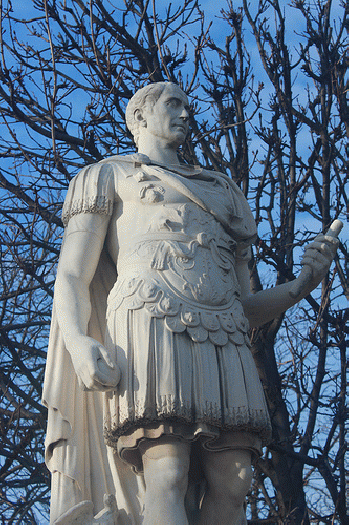
From flickr.com/photos/30715613@N04/4242888744/: Statue of Caeser
(Image by Unknown Owner) Details DMCA
Realizing the
American Dream Nightmare
He came to power to fix a broken government. He rallied support by appealing to fear and hatred. He emphasized military might and military solutions. He developed a cult of personal loyalty to himself.
Trump? Or Caesar, or Hitler.
It is not likely that Trump's leadership will finish off American democracy, but we would not have expected the Romans or Germans to cheer away their republics, either.
Too much like America today, Julius Caesar's Rome was beset with self-serving factions dominated by a self-serving Patrician class. In the midst of political corruption, Caesar promised to help the common man, some of which he did with a policy of land redistribution. But he also built the machinery of self-promotion. He sustained close government-military connections. He drummed up his success by parading his triumphs before the public. He surrounded himself in government with personal friends, to the point that their betrayal, a stabbing at work, surprised him--Et tu, Brute'? as Shakespeare rendered it. This supposed champion of the common man took away their democracy. Under his rule the Roman Republic died and the Roman Empire began. War and intrigue followed his assassination, but ultimately Caesar's adopted son became Rome's first official emperor.
Nearly 2000 years later, Hitler's Germany was dysfunctional, a broken, impoverished and humiliated nation. Hitler promised to make Germany great again. He rallied support by directing public anger against a vulnerable ethnic group, insinuating and then promulgating Jewish guilt, inferiority, and legal persecutions. He developed his military to public acclaim, adopted the semi-historical "Hail, Caesar!" as "Heil, Hitler!" and made it a mandatory recognition of his supremacy. He then launched perhaps the most far-reaching, horrendous, inhumane episode in human history.
Now America has Trump. He comes to power to fix a broken government, beset by self-serving factions that put party and class ahead of country. He rallies support by belittling the vulnerable. He parades and exaggerates his successes. He celebrates military prowess, and is nominating military officers to civilian positions. Personal loyalty is a primary value in the vetting of his nominees and appointees. He even seeks to put his children into positions of government power.
The parallels and connections become bizarre. Trump claims he has no time to read, but apparently a priority was a copy of Hitler's speeches, which he kept at bedside, according to Ivana, one of his ex-wives. He has a well-demonstrated penchant for subservient Aryan-looking women. Like Hitler, he claims he will make his nation great again. Even his grandfather's name change from Drumpf to Trump echoes Hitler's father's name change from Schickelgruber.
Things like name changes are important only if they create parallels in Trump's own mind. But the other stories indicate that maybe they do. The development of a government based on personal loyalty is dangerous. The merging of civic and military power is dangerous. The ethnic and religious ridicule, passed off as it was eighty-five years ago because it just can't be real, or eventually because it is accepted, is dangerous. Trump equates opposition with crime. Whether in the ugly sport of "Lock her up" or in seeking identities of Energy Department staff who attended climate change talks, his practice is a condition of tyranny, not the rule of law. Collectively, and particularly in the hands of arrogance, these elements are a disaster waiting to happen.
Our president-elect is a successful politician. He says much that is self-contradictory, allowing us plebes to find hope in whichever words we favor. But his actions fit with the actions of the most catastrophic of powerful leaders. He promotes racism and religious tyranny. He is putting into power people who wave the banners of oppression, people who oppose living wages and public health.
Hitler ended Germany's republic after civic unrest, suspending civil rights and parliamentary control. It is easy to see such unrest in America today, as political, economic, and environmental oppression, both at home and abroad, create social turmoil. It is easy to imagine that a leader of Trump's temperament would be ready and eager to control that turmoil with some form of martial law. Such action fits with his rhetoric, that of his Cabinet selections, and, frankly, with powerful parts of the Republican Party that has supported his ascendance. It is easy to see another democracy fail at the hands of corruption and ambition.
American institutions are strong. We have two-hundred forty years of democratic tradition. But Rome had twice that. Wishful thinking is not reshaping our president-elect.
The nation's legal recourse is limited at this point. Perhaps the horrendous, undemocratic Electoral College could do for once what it was at least partially designed to do--choose as president a less unfit candidate. Perhaps the Senate, made by Constitutional processes a briefly Democratic majority in January, could confirm a Supreme Court justice who could help restrain Trump. Perhaps the Republican congress will rein in their Frankenstein with sober advice and consent regarding his Cabinet nominees, as well as with coming legislation. Other than that--the people have spoken, the die is cast. Perhaps we just struggle day to day to see whether in America democracy will follow decency down the toilet.





